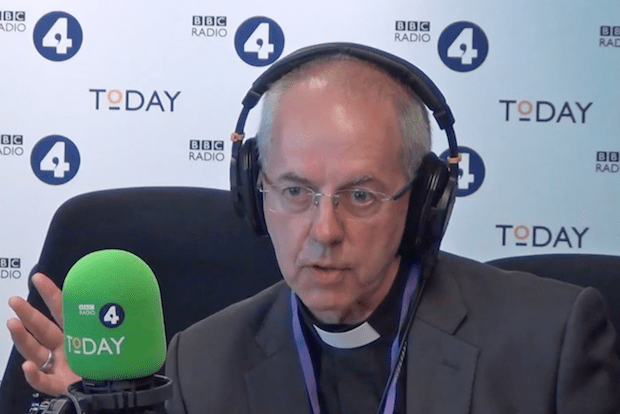You have to try really hard to get any idea of what the Archbishop of Canterbury, Justin Welby actually said in his interview for the BBC Today programme, the one where he said the BBC had acted with less integrity than the Church of England or the Catholic church when it came to the abuse of children by Jimmy Savile. You may well have heard that part because it is what the BBC itself reported on its own news broadcasts and duly, every other news outlet followed its lead.
And the reason you can’t put the remarks in context is that the interview itself hasn’t yet been broadcast – it’s part of a series of interviews with prominent people for the 60th anniversary of the programme next month. For anyone listening to Today this morning, the first thing they heard was the news that the Archbishop had condemned the BBC and only much later did they get the context for that observation, when the programme got round to giving a fuller extract from the actual interview, which is to do with the way society has changed in the six decades of the Today programme. And what was striking was a) that the observations about the BBC were obviously only a small part of his remarks and b) that the other things he had to say were a good deal more interesting.
He observed, for instance, that society had become much kinder than it was and people were respected more, qua people. “the flip side of that”, he added, is “radical autonomy, the individualism that says, if it’s right for me, it’s right – and that can lead to great cruelty and great intolerance of minorities in a way we can raise questions about.”
He also went on to quote a senior politician who observed to him that the defining issue of the 21st century is identity. “That questioning of identity has come from within our society and around the world”, he went on, “and… it’s kicked in through massive… enormous… technological change…particularly social media which enables people to live in self-reinforcing bubbles of like-minded people – that is on the one hand a wonderful means of communicating a need for help and support… or of persecuting and damaging people… it’s a very ambivalent medium. Those are huge, huge changes.”
I don’t know about you, but I think the Archbishop touched on some fundamental issues here. He’s not the first to do so of course, but that stuff about radical autonomy and individualism on the one hand – “if I think it’s right, it’s right” – and, on the other, the observations about the cruelty that social media makes possible, cut right to the heart of where we’re at right now. The self-obsession, the fixation with subjective truth, the inability to engage in proper argument rather than participate in online lynch mobs, the social isolation that goes with a technologically connected world; Justin Welby usefully raised, briefly, some important questions. The business about autonomy versus connectedness could make for a really interesting discussion.
Except we won’t get it because the BBC opted to focus on the one bit of the interview where Justin Welby had the impudence to criticise it. Perhaps – probably – he was rash to say that the BBC’s response to Savile had less integrity than that of the churches when it came to abuse, but was it really that interesting? If the Corporation has done one thing, it’s to bear out what the Archbishop says that the reflexes of institutions are to protect themselves. Justin Welby may well feel he’s been stitched up by the BBC – quoted out of context and with one observation blown out of all proportion from the rest and used to condemn him – the programme promptly invited victim support groups to take issue with his remarks. Presumably he gave this interview in a friendly spirit. Well, that’ll teach him.







Comments